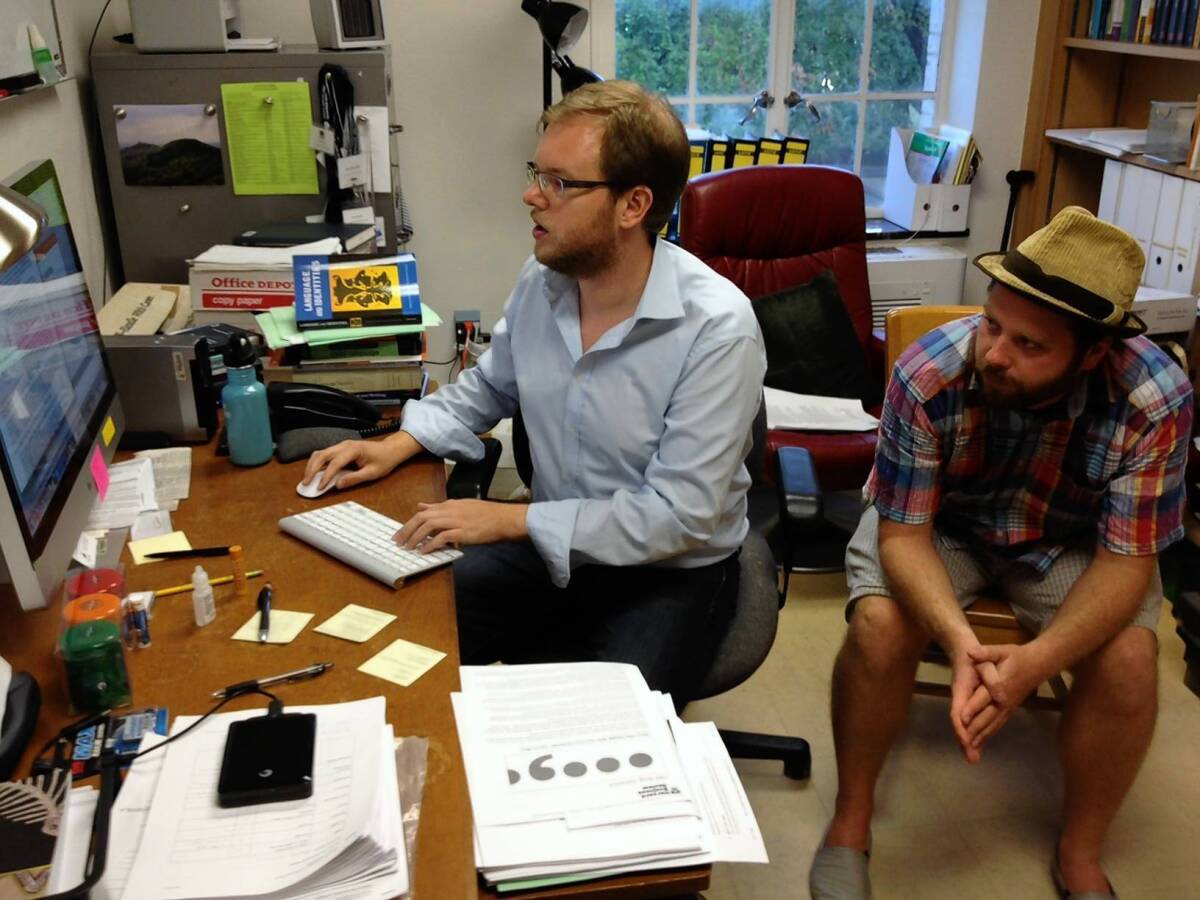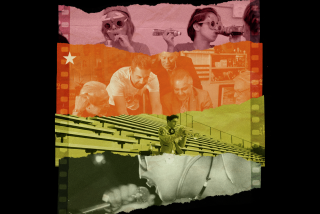Texas talk is losing its twang

- Share via
AUSTIN, Texas — Don Graham, an English professor at the University of Texas at Austin, likes to tell the story of a student who once worked as a cowboy. “Wore hat and boots,” Graham says. “He was the real deal.”
At the end of the academic year, the student told Graham, “You were the only professor at UT I ever had who spoke English.”
“What he meant,” Graham says, “was I was the only one who spoke his language.”
And by language, the student meant talking Texan — the distinctive twang and drawl that becomes almost an attitude, from the first “howdy” to the last “thank you, kindly.” Conversation can be as extreme as the landscape in Texas, where locals will tell you it gets hotter than a stolen tamale and the wind blows like perfume through a prom.
The former cowboy had noticed what Graham, a Texas native who grew up outside Dallas, had also detected over the years. “Texas has always had its own almost national identity,” Graham says. “Language was one of the commonalities that bound people together. More and more, I hear fewer people that I talk to who sound like myself.”
Research bears out his suspicion: Urbanization, pop culture and an influx of newcomers — including Californians, with a Valley Girl dialect that has wormed its way into American speech since the 1970s — are all eroding the iconic Texas twang.
Back in the 1980s, about 80% of Texans interviewed by researchers at UT Austin, including many students, had traditional Texas accents. Now that’s down to a third.
The uniquely Texas manner of speech is being displaced and modified by General American English, the generic, Midwestern dialect often heard on television. That’s surprising, given the Texas accent’s enduring nature.
The Texas accent “has great symbolic value. It has a local identity versus, say, Arizona English. That makes Texas English more resilient,” said Lars Hinrichs, an English language and linguistics professor at UT Austin.
There are many aspects to “talking Texan”: pronunciation, cadence, syntax, not to mention vocabulary. And, technically, there are several Texas accents — the drawl of East Texans like Matthew McConaughey, say, or the nasal West Texas twang of Laura Bush.
By interviewing and monitoring scores of Texas speakers, then measuring sound waves when they speak, Hinrichs and a team of researchers at UT Austin’s 5-year-old Texas English Project hope to gauge the degree to which Texas accents and dialects have changed.
Texas accents are traditionally considered variants of Southern American English, spoken from southern Maryland to eastern New Mexico, noticeable in words like pie (pah) and my (mah).
But in Texas that pronunciation varies, especially when the vowel is followed by a consonant, which some Texans pronounce as a diphthong, or two-part sound. Examples of Texified diphthongs: “TRAY-up” (trap), “FAH-ees” (face) and “KAY-ut” (cat).
Many younger Texans are abandoning the diphthongs, and can no longer differentiate the vowels in cot and caught (CAW-ut) — just like Yankee counterparts, according to UT Austin researchers.
A similar transition is taking place with the “oo” vowel sound.
“For instance,” Hinrichs says one day at his office as he pulls up graphs of sound waves on his office computer. “What does a Texas ghost say?”
That would be “boo,” with the vowel sounding like the “oo” in “goose.” At least if the ghost talks like an old-time Texan.
A modern Texas ghost might say “beeew.” The new pronunciation is a variation of the monophthong that sounds more like a diphthong, more typical of both Northern and Midwest speakers.
Hinrichs’ graphs showed that change, or “dialect leveling,” as divergent lines, most apparent among younger speakers. It appears to have spread from Dallas to Houston and into central Texas. One of his graduate students, Axel Bohmann, 28, speculates that the change was due in part to younger people “style shifting,” speaking with different accents in different settings — say, at home and at work — or adopting aspects of accents they hear in mass media.
“Young women are generally more attuned to the prestige of things: clothes, makeup and language. So they play around with that,” Hinrichs says.
He and Bohmann are both from Germany, drawn to central Texas by its mix of dialects and accents, the legacy of Southern, Mexican and German immigrants.
“It’s one of the most vibrant places to study language change and dialects,” Hinrichs says. “Dialects used to be a simple function of place. Now they’re a more complex function of identity.”
Another doctoral student working with Hinrichs, Kate Shaw Points, is a 32-year-old Boston native who has lived in Texas for almost a decade. In that time she’s learned to talk Texan, but deploys it strategically.
“When I’m at the mechanic, I talk like a Texan because I don’t want them to cheat me,” she says, but when she’s watching a Red Sox game, she reverts.
She researched people who, depending on the setting, changed the way they said the “i” in “time.” They might give it a Southern “ah” sound among fellow Texans, then switch to the clipped standard English “eye” in other settings.
In many ways, talking Texan is about belonging and regional pride. “That’s another reason you’re never going to see the Texas accent go away,” Points said.
That’s true. But the way of talking is changing.
Deborah Darnell, 51, a substitute teacher from Austin interviewed by the Texas English Project, says students are sometimes surprised by her pronounced accent.
“Where are you from?” they ask. “Do you live in the country?”
Sometimes she jokes with them: “Oh yeah, I’ve been up since dawn, milking the cows and roping the horses.”
Darnell doesn’t even consider her accent that strong, certainly not compared with her grandmother “from San Antone” or her mother.
“My mom — she’s got a strong accent! She’s 75 and she’ll say, ‘Oh my heavens, I sound like Lady Bird Johnson!’” Darnell said. “There’s not as many Texans, true Texans, anymore, because there’s a lot of people moving here from all over.”
The state is full of new arrivals, and they are probably having an impact on Texas speech, Hinrichs said. Texas led the nation in migration from other states as of the last census with 486,558 newcomers — the majority, nearly 69,000, from California.
The late Larry Hagman of “Dallas” fame noticed the change as well.
“Now people are from Milwaukee or New York — someplace else. Dallas has just exploded,” Hagman, 81, said while filming in Dallas a few months before he died in November.
Hagman, a native of Weatherford, outside Fort Worth, had lived all over the world — including Malibu and London. But when in Texas, he talked like his oil baron character, J.R. Ewing — for instance, “It was so hot you could fry eggs on the cement.” And that’s pronounced SEE-ment.
“And I still say ice box,” he said. “When you’re down here, you try to fit in. It makes people more comfortable.”
Another of Hinrichs’ students, Gina Forsythe, 22, is among the vanguard of young Texas speakers. Her mother is of Mexican and Puerto Rican descent, her father white. She definitely sounds Southern but doesn’t consider her accent truly Texan.
“Whenever I hear the true Texas accent, I think it sounds so funny,” Forsythe said. “I don’t know if it’s because me and my peers are not using it as much, or if we’re subconsciously choosing not to.”
Among Forsythe’s set, there’s a stigma attached to talking too traditionally Texan.
“So much of what’s driving the new vocabulary is Internet culture — Facebook and Twitter and shortening words,” she said. “I still hear Valley Girl lingo constantly, and of course I’m a part of it — like, like, like, every other word.”
Two key indicators that Forsythe speaks with a new Texas accent: She pronounces “pin” and “pen” differently (in traditional Texan, both sound like “pin”) and “cot” and “caught” the same, like someone outside the Lone Star State. She also avoids phrases like “might could,” “fixin’ to” or “down yonder.”
But there are certain shifts even Forsythe is unwilling to make. Her boyfriend is from Connecticut, and instead of “y’all” says “you guys.”
“It sounds so outdated and gender-unfriendly,” she said.
And then there’s “yous guys,” a “Sopranos” staple Forsythe heard during a trip to New York City — and won’t be repeating.
“That doesn’t even make grammatical sense!”
molly.hennessy-fiske@latimes.com
More to Read
Sign up for Essential California
The most important California stories and recommendations in your inbox every morning.
You may occasionally receive promotional content from the Los Angeles Times.











